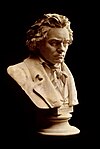Three Bs
"The ThreeBs"generally refers to the supposed primacy ofJohann Sebastian Bach,Ludwig van Beethoven,andJohannes Brahmsinclassical music.It was derived from an expression coined byPeter Corneliusin 1854, which addedHector Berliozas the third B to occupy the heights already occupied by Bach and Beethoven. Later in the century, conductorHans von Bülowsubstituted Brahms for Berlioz.
Origins
[edit]In an article in theBerliner Allgemeine Musikalische Zeitungin 1854, Cornelius introduced Berlioz as the third B, concluding his article with the cheer, "Bach, Beethoven, Berlioz!"[1] Niccolò Paganinihad even earlier (1838) identified Berlioz as the worthy successor of Beethoven. Hans von Bülow, two years before Cornelius' article, called Berlioz "the immediate and most energetic successor of Beethoven".[2]
Decades later, Bülow composed the followingpunto a friend: "Mein musikalisches Glaubensbekenntniss steht in Es dur, mit drei B-en in der Vorzeichnung: Bach, Beethoven, und Brahms!"[3]B,in German, stands for the noteB♭as well as for theflat sign.The remark may be translated, roughly, as "My musicalcreedis in thekeyofE-flat major,and contains three Bs [flats] in itskey signature:Bach, Beethoven, and Brahms! "Bülow had been attracted to the idea of a sort ofHoly Trinityof classical music for a number of years, writing in the 1880s: "I believe in Bach, theFather,Beethoven, theSon,and Brahms, theHoly Ghostof music ".[3]He further linked Beethoven and Brahms by referring to the latter'sFirst Symphonyas Beethoven's Tenth (though Brahms disliked the comparison, thinking it impliedplagiarismrather than the homage he had intended).
Later developments
[edit]In the 21st century,David Matthewssuggested that if there was a "Fourth B" added to this legacy, it could beBenjamin Britten.[4]
In popular culture
[edit]- In aPeanutsstrip (published February 22, 1952), whenSchroederis seen composing on the piano,Charlie Brownsays "You've heard of Bach, Brahms, and Beethoven, right? Well from now on it's going to beSchubert,Schumann,and Schroeder. "[5]
References
[edit]Citations
[edit]- ^Barzun 1969,p. 76.
- ^Comini 2008,p. 249.
- ^abSlonimsky 1998,p. 99
- ^Matthews 2013,p. 4.
- ^Robinson-Greene 2016,p.42.
Sources
[edit]- Barzun, Jacques(1969).Hector Berlioz and the Romantic Century.Vol. II. New York: Columbia University Press.
- Comini, Alessandra(2008).The Changing Image of Beethoven.Santa Fe: Sunstone Press.
- Matthews, David(2013) [2003].Britten(Centenary ed.). London: Haus Publishing.ISBN978-1-908323-38-5.
- Robinson-Greene, Rachel (2016). "Rhapsody on a Theme by Schroeder". In Richard Greene; Rachel Robinson-Greene (eds.).Peanuts and Philosophy: You're a Wise Man, Charlie Brown!.Open Court.ISBN9780812699531.
- Slonimsky, Nicolas(1998).Slonimsky's Book of Musical Anecdotes.New York: Schirmer.
Further reading
[edit]- Abert, Hermann;Martens, Frederick H. (April 1927). "Bach, Beethoven, Brahms".The Musical Quarterly.13(2): 329–343.doi:10.1093/mq/XIII.2.329.JSTOR738416.

